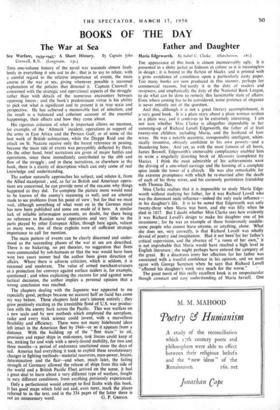BOOKS OF THE DAY
The War at Sea Sea Warfare, i939-194s: A Short History. By Captain John
Creswell, R.N. (Longmans. 2ss.)
THIS one-volume history of the naval war succeeds almost fault- lessly in everything it sets out to do ; that is to say to relate,, with
a careful regard to the relative importance of events, the main course of the war at sea, giving whenever possible a reasoned explanation of the policies that directed it. Captain Creswell is concerned with the strategic and operational aspects of the struggle, rather than with details of the numerous encounters between opposing forces ; and the book's predominant virtue is his ability to pick out what is significant and to present it in true scale and perspective. He has achieved a memorable feat of selection, and the result is a balanced and coherent account of the essential happenings, their effects and how they came about.
His rigorous criterion of what is important allows no mention, for example, of the Altmark ' incident, operations in support of the army in East Africa and the Persian Gulf, or of some of the best work of British submarines, while the Dieppe Raid and the attack on St. Nazaire receive only the barest reference in passing, because the main tide of events was perceptibly deflected by them.
On the other hand, brief narratives are given of major battles and operations, since these immediately contributed to the ebb and flow of the struggle ; and in these narratives, as elsewhere in the book, there is a clarity of description which can only come of real knowledge and understanding.
The author naturally approaches his subject, and relates it, from the Allied standpoint ; and, as far as British and American opera- tions are concerned, he can provide most of the reasons why things happened as they did. To complete the picture more would need to be known of the enemy's reasoning as well, and an attempt made to see problems from his point of view ; but for that we must wait, although something of what went on in the German mind has now been published and some use made of it here. A similar lack of reliable information accounts, no doubt, for there being no reference to Russian naval operations and very little to the parts played by other European Allies, though here again, valiant as many were, few of these exploits were of sufficient strategic importance to call for mention.
The main pattern of events can be clearly discerned and under- stood as the succeeding phases of the war at sea are described.
There is no bickering, no pet theories, no suggestion that fleets were commanded by sub-humans or that the war would have been won two years sooner had the author been given direction of affairs. Where there is adverse criticism, which is seldom, it is reasoned and moderate. The value of armed merchant-cruisers as a protection for convoys against surface raiders is, for example, questioned ; and when explaining the reasons for and against some tactical decisions, the author implies a personal opinion that a wrong conclusion was reached.
The chapters dealing with the Japanese war appeared to me especially good, perhaps because no account half so lucid has come my way before. These chapters hold one's interest entirely 9 • they
grow positively exciting as the irresistible flood of U.S. war .produc- tion rolls the enemy back across the Pacific. This was warfare on
a new scale and by new methods which employed the aeroplane, radar and every trick science could invent, with a marvellous flexibility and efficiency. There were not many hidebound ideas left intact in the American fleet by 1944—or so it appears from a distance. With the building up of the " fleet train" to oil, provision and repair ships in mid-ocean, task forces could keep at sea, striking far and wide with a newly-found mobility, for two and three months—a period of endurance unattained since the days of sail. America had everything it took to exploit these revolutionary changes in fighting methods—material resources, man-power, brains, determination and the flair—and when, much later, the failing strength of Germany allowed the release of ships from this side of the world and a British Pacific Fleet arrived on the scene, it had a great deal to learn about a very different type of warfare, fought in very different conditions, from anything previously experienced. Only a perfectionist would attempt to find faults with this book. It has good maps which fold out and, even rarer, mark the places referred to in the text, and in the 334 pages of the latter there is


































 Previous page
Previous page